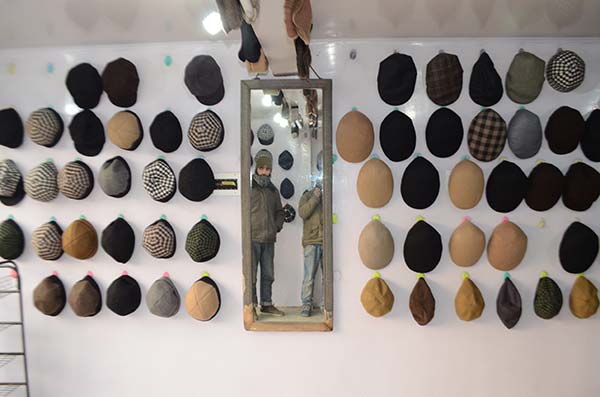Bilal Handoo | Safwat Zargar

Much before the dawn of December 14 was wrapped under a thick cover of mist and chill, paramilitary forces and police had sneaked into the alleys, lanes, streets and roads of the city. Amid this tight vigilance, Srinagar’s eight assembly segments were dating polling.
In Nowhatta, the main chowk was choked with heavy enforcement. But at stone’s throw, there was a crowd before a polling booth. Those who turned up for the polling had more than one reason to fall in lines. “I have come to vote to end a cycle of discrimination the city faces for not voting,” said a fresh voter from Nowhatta, Zubair Wani, 24. “But look,” he continued, “my vote has nothing to do with larger political reality of Kashmir. My vote is not a sign of treachery. It is my way to end the developmental discrimination. That’s it.”
The booth before which he was doing all the talking had recorded 222 out of total 1019 votes till 11.55 AM. But the same fervour was missing from other places. A quick search informed that most of the voters were from the traditional voting belt—Sheikh Colony. But for the day, the area under the firm grip of government forces had given up the idea to confront the activity readily seen as “sign of sell out”. There was no angry response—but one: “who cares!” “Look,” said one youth sitting on shop-front, “it is just an absurd activity for me. Majority here don’t even give a damn to this ballot activity.”
But at a short distance from Nowhatta, Zadibal was in the grip of rants and chants. Voting crowd before Imamia School had literally turned into a battleground for ‘waging storm in a teacup’! Ire was coming due to confrontation between two groups: NC and PDP. Police had to intervene to pacify the tempers. Amid all this, it was total thaw of polling in the area driven by “emotional” vote for the departed cleric Iftikhar Hussain Ansari whose brother Abid Ansari is PDP’s candidate from the area.
But then, amid the brisk polling, there were some present before the polling booths in the area keeping a close look on the poll movement around. “Something inside me prevents me from voting,” said Mushtaq Ali, 49. “I have never cast vote in my entire life and there is no question to cast it.”
Deserted streets made glaring presence towards Soura. Near the police station Soura, some cops were apparently in pain after angry boys pelted stones on them. The windowpanes of their vehicles were smashed. In the interiors towards 90 feet, some occasional outbursts of stone pelting had happened. The area was looking tense. Streets littered with smashed glasses, bricks and stones were a signal for not taking up the route.
In nearby Anchar, the mood was mixed. Boycott and brisk polling were going hand in hand. In Illahibagh Buchpora, polling staff and security men were outnumbering voters at a community hall. Only 29 votes were polled till 1.15 in the noon out of total 1239.
Metres away from the grave of National Conference’s founder Sheikh Abdullah, a row of polling agents were lined up with lists of electors. In the compound of one of the polling stations, excited polling agents were cherishing Lipton tea with crispy Katlams. Voters came in twos and threes but were not enough to form a line.
Outside the makeshift polling station of corrugated tin sheets and wood at Rainawari, three young men clad in Pherans, sitting on an iron bench braved cold with Kangris babied in their laps. “We are voters,” said one of the youth, wearing spectacles. “Our vote will go to a lawmaker who solves our daily problems.”
On asking the trio about the pro-freedom sentiments tempering high in the old city, the reply matched confusion with a tinge of hope for freedom. “Freedom will not be unequal. When it [Freedom] will come, it won’t be only for boycotters. Voting and freedom struggle is different.”
At Chota Bazar, the eerie silence of pro-boycott mood made the presence of dozens of camouflaged CRPF personnel tenser. The polling staff in the three polling booths housed in a school showed no tiredness. Waiting for some 1278 registered voters to ink their fingers, only 27 had showed up by 2 in the afternoon. A group of boys, apparently affiliated with a political party, jostled in the school park. One of the boys, seemingly elder in the group, was suggesting to pool some 200-300 rupees to bring some eating stuff.
While the city looked naked with no traffic and movement on the election day, private taxi drivers near Natipora polling station had a busy day. They were entrusted with a job of ferrying women with babies in lap and aged voters from peripheries to the EVM. Men, huddled outside the station, elbowed each other after scanning every face alighting from the hired cars.
In Kursoo Raj Bagh, rebuilding and voting ran simultaneously. Voters said “hate” had brought them out to vote. Hate had a name: Nasir Aslam Wani, the current MLA. Masons and workers rebuilding new houses from the rubble chuckled out at the poll mood decorating the recently-plugged Jhelum bund. “Our lives were destroyed by floods and nobody cared. Floods have changed us and we will change the government,” said Mohsin Ahmad, a first-time voter.
“Percentages are lies,” said Sarfaraz Nabi, a 33-year old, bank employee from Jawahar Nagar. “Feelings and sentiments can’t be measured in numbers. We have thousands of martyrs and disappeared persons but each tragedy is as colossal as the other. Confusion seems to be the only food Kashmiris are digesting. It is banal that people are voting for bijli, sadak aur pani and not for justice, dignity and honour.”
“I will vote,” he added, “when there will be freedom.”















